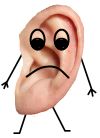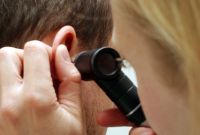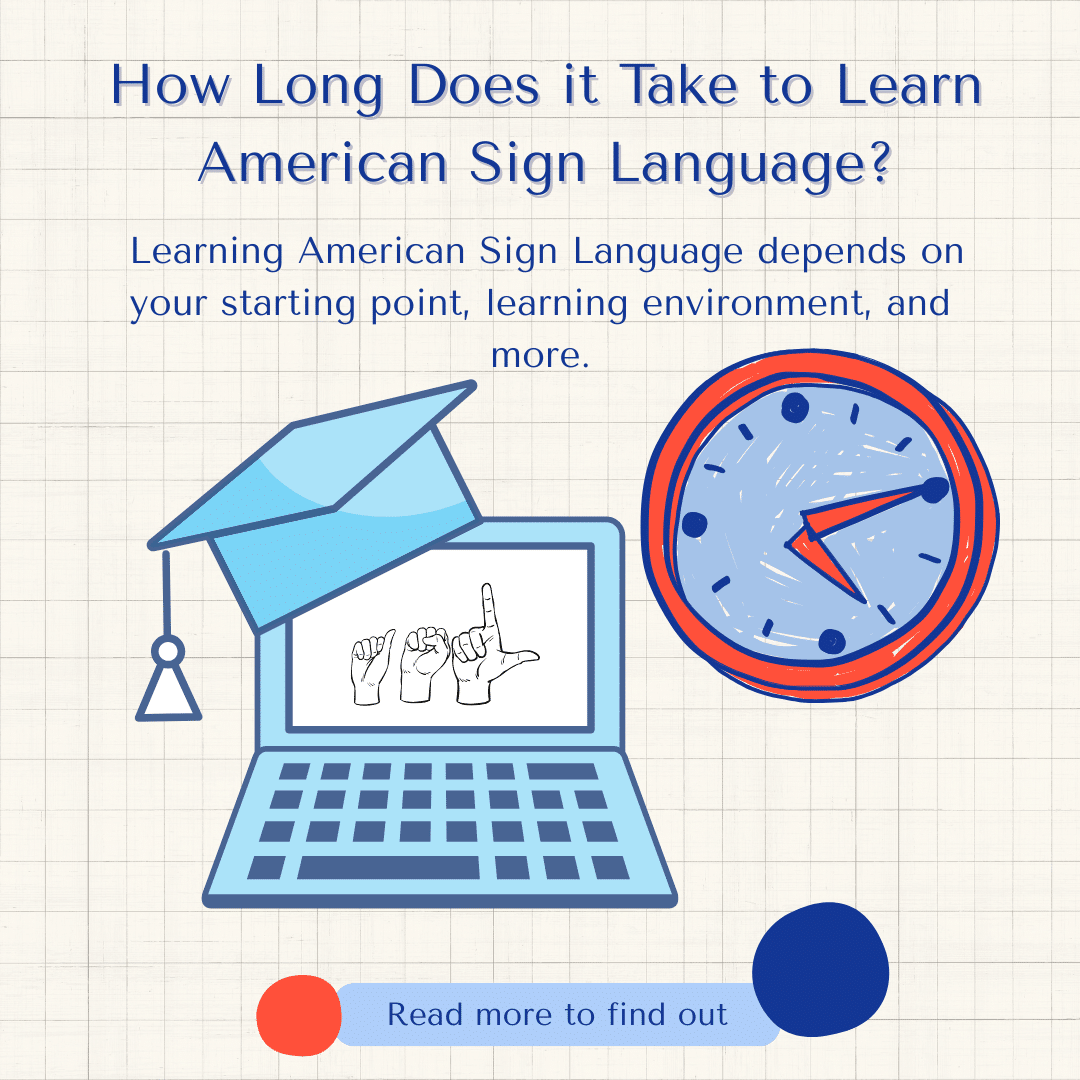
Hearing Loss or Deafness Gain?
- by Michelle Jay
Hearing loss is more like “Deafness Gain” to people who are part of Deaf Culture.
The loss of hearing is actually a very small part of being a Deaf person. However, it’s very useful to study the implications of deafness when you’re becoming involved in the Deaf community.
 Most hearing people only see the lack of hearing when thinking about a deaf person…
Most hearing people only see the lack of hearing when thinking about a deaf person…
Like the deaf person is only a big ear and not an individual with a life that exists outside of their ears.
There are two types of hearing people in the field of deafness:
- The group of hearing people who regard a deaf person’s “handicap” first, and deaf people as individuals second.
(The ones who see a “big ear”) - The group of hearing people who regard deaf people as individuals before their lack of hearing.
(The ones who see an individual)
Understanding the difficult medical system related to hearing loss will help you take the correct stance when learning about Deaf people, and will also help you understand what is really going on in a deaf person’s ears.
The Medical View of Deafness
The medical journey of a person who has lost their hearing involves a lot of repeated testing, diagnosing, confusing information, many options, and difficult choices.

The direction of their life truly depends on the information offered and choices made during this time.
Hearing tests are actually very complex, and sometimes disturbing. The way that infants are screened may seem OK to hearing people, but is strongly rebuked by the Deaf community.
Deafness can occur in many different parts of the ear.
Ear Anatomy is not as complex as you might think it is. There are only a few anatomical parts that make hearing possible. However, if there is something wrong with any one of those small pieces, hearing can be lost completely.
Hearing loss is categorized by the part of the auditory system that is damaged. There are three main types of hearing loss: conductive, sensorineural, and mixed. These types of hearing loss can also occur in only one ear, which we call a unilateral hearing loss.
Types of Deafness
Conductive Hearing Loss
You have a conductive hearing loss if something is keeping sound from entering your outer or middle ear. This hearing loss can be either temporary or permanent. It can also usually be treated successfully.
Conductive hearing loss occurs when something is keeping sound from entering the outer or middle ear. It can be either temporary or permanent and can usually be treated successfully.
Causes
There are many causes of this type of hearing loss (a lot of which are common):
-
- Earwax (cerumen) buildup in the ear canal
The earwax can prevent sound from entering the inner ear. - Fluid buildup in the middle ear
- Foreign bodies in the ear canal
- Damage to or scarring of the eardrum
- An ear infection (otitis media)
- Otosclerosis (abnormal growth of bone in middle ear)
- Swelling of the Eustachian tube
The Eustachian tube keeps the air pressure on each side of the eardrum equal and can swell when you get a cold or the flu. When the pressure around the eardrum is unequal, it can cause conductive deafness. - Scuba diving and flying in an airplane
These activities can cause the air pressure around the eardrum to become unequal.
- Earwax (cerumen) buildup in the ear canal
Treatment
Depending on the cause, treatment for a conductive loss can be quite easy. Earwax that is blocking the ear canal can be removed (by a trained professional only!) Antibiotics can be used to treat the infections that cause conductive deafness. Fluid buildup in the middle ear can be drained.
Sensorineural Hearing Loss
Sensorineural hearing loss (“nerve deafness”) is when there is nerve damage to the inner ear or brain. This damage then keeps nerve impulses from reaching the auditory part of the brain. The nerve damage can occur in the brain, cochlea, or the ear’s auditory nerve. This hearing loss is permanent and cannot be cured.
Causes
There are several known causes of sensorineural deafness:
-
- Diseases
Including but not limited to: chicken pox, influenza (the flu), arteriosclerosis, Meniere’s disease, mononucleosis (mono), meningitis, mumps, syphilis, and Rh disease. - Rubella (German measles)
Many mothers who developed rubella during the first three months of pregnancy gave birth to deaf children. - Tumors in the ear
- Concussions
- Head trauma
- Over-exposure to loud noises
- Aging
- The effects of some drugs
- Diseases
Treatment
Sensorineural deafness cannot be cured medically.
However, there are a few main options available that may improve hearing for people with this type of hearing loss:
-
- Hearing aids
- Assistive listening devices
- Cochlear implants
Each of these options is not for everyone. Their success depends on the type of hearing loss, the time of onset, the amount of residual hearing left, and a number of other factors.
Mixed Hearing Loss
You have a mixed hearing loss if you have a combination of both conductive and sensorineural hearing loss. This usually happens when there is both inner ear or nerve damage and damage to the outer or middle ear.
Unilateral Hearing Loss
You have a unilateral hearing loss (UHL) if your loss of hearing is experienced in only one ear. UHL can happen to you no matter how old you are and is surprisingly common (one of out 1000 children is born with UHL).
It is difficult to know the cause of UHL, but here are some possible causes include:
-
- Hereditary hearing loss
- Certain illness or infection
- Over-exposure to loud noises
- Brain trauma
Causes of Deafness
The causes of deafness for the different kinds of loss of hearing are completely different. They also have completely different treatment options. Sensorineural deafness is more common, but less likely to be “fixed;” while conductive deafness, the lesser common type, can actually be treated quite easily.
Heredity seems to be the most common of the causes of hearing loss in children. Hearing loss doesn’t seem to be passed down from one generation to the next. Most children born deaf have parents who are hearing.
When a child is born deaf, that doesn’t necessarily mean the deafness was hereditary. Complications during pregnancy is also one of the causes of hearing loss. In the 1960s, many babies were born deaf because their mothers caught rubella, the German measles, while they were pregnant.
Causes of hearing loss in adults as well as children can also be attributed to specific illnesses including meningitis, prolonged high fever, head injury, and using certain medications.
One half of the adults who have lost their hearing lost it because of continual exposure to loud noise (including loud music) or aging. About 30% of people over the age of 65 experience some hearing loss.
Earwax buildup in your ear canal, fluid buildup in your middle ear, foreign objects in your ear canal, an ear infection, and many more symptoms cause the more common type of hearing loss.
Some causes for the incurable type of hearing loss are: chicken pox, the flu, concussions, and tumors.
If you do not want to lose your hearing, it’s important to be protective of your ears, your head, and your health. When you get older, don’t be surprised when you can’t hear much any more. That’s just a way of life. To lessen the amount of hearing you may lose when you age, stay away from loud music. Don’t stand next to the speakers at a concert. And don’t go around hitting your head on things.
Deaf Technology
With the advent of new deaf technology, there are also several devices that are available to make the loss of hearing not as much of a “loss.” Some available products are:

- Deaf Alarm Clocks
- Deaf VP Videophones
- Learn more about Video Conferencing
- Hearing Ear Dogs
- Closed Captioning
- TTYs
Hearing people take many things for granted, including waking up to an alarm in the morning, talking on the phone, and watching television. However, these options definitely help a deaf person live their life a little easier.
How deaf people live their lives after a hearing loss diagnosis depends on the information they are given and what they choose to do with their options…
The Individual View of Deafness
Deafness means more than just the loss of hearing. The term “deafness” tries to simplify all the aspects of being Deaf.

The sense of hearing is only one of our five senses. The change that takes place in the life of a person who has lost their hearing depends on two main factors:
- When the person lost their hearing
- How much hearing they lost
Having a degree of hearing loss does not necessarily make you Deaf. Deafness is only the physical aspect of being a Deaf person.
To really understand what makes a Deaf person Deaf, you have to get to know Deaf people. A great way to do this is to read blogs written by Deaf people. They often write about issues in the Deaf community and really exhibit the values and beliefs of Deaf culture.
A great blog to read would be the blog of Dianrez. She is a very well known Deaf blogger, and we highly recommend subscribing to her blog. If you want to get to know a little more about her first, she was kind enough to share her insights in an interview with us. You can read this interview on our Dianrez page. Understanding the Deaf community will greatly influence the way you learn ASL. It’s absolutely necessary.
If you have ever wanted to read articles written by a deaf person, we highly recommend Jamie Berke’s articles on her About.com Deafness Guide. She was kind enough to let us interview her, and we have posted the interview on our Jamie Berke page. You will find links to her blog, forums, and articles. Her insights are wonderful for looking into and understanding the life of a deaf person.
There is a special distinction between Deaf, deaf, hard of hearing, and hearing-impaired individuals that have nothing (really, nothing) to do with the loss of hearing.
A deaf person will live their life a certain way depending on the factors mentioned above. Some deaf people do not want to be deaf and want to be “fixed” (they have the same beliefs as the first type of hearing person), while others love being deaf and do not want to be “fixed” (the same beliefs as the second type of hearing person).
The side that you take depends on where you stand. However, if you wish to be a part of the Deaf community, you most certainly need to be the second type of hearing person (or your conversations with Deaf people will most likely be arguments!)
Start Learning ASL Today!
 Ready to start learning real American Sign Language and not just basic signs? Do you want to be a part of the vibrant Deaf community? Check out our Free ASL 1 Course or our Complete 4-Level ASL Course options and start learning ASL today!
Ready to start learning real American Sign Language and not just basic signs? Do you want to be a part of the vibrant Deaf community? Check out our Free ASL 1 Course or our Complete 4-Level ASL Course options and start learning ASL today!









One Response
You made a good point when you talked about how it is important to be protective of your ears so that you don’t lose your hearing. I would think that it would be a good idea to visit a hearing clinic a couple of times a year. That way you can have your hearing checked and make sure that your ears are in good health.